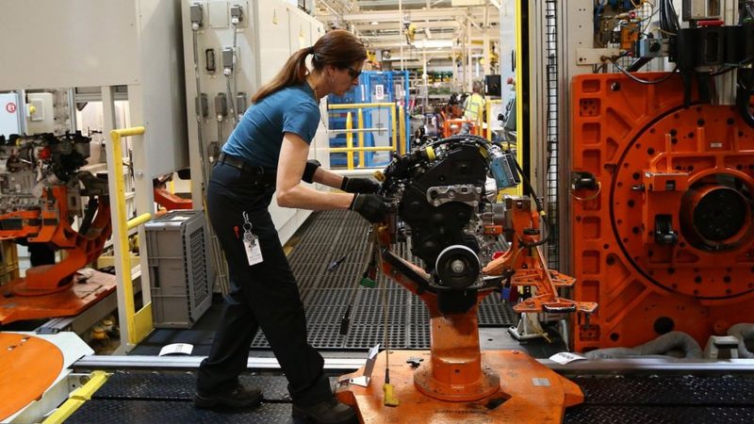The UK's motor industry could suffer production losses of £55bn over the next five years if no Brexit deal is agreed, the sector's lobby group says.
The Society of Motor Manufacturers and Traders is urging the government to get a deal that avoids resorting to tariffs under World Trade Organization rules.
The automotive sector across Europe has already been badly hit by the pandemic, the SMMT said.
A further blow from trade tariffs would set it back further, it added.
UK car industry warns of £55bn no-deal Brexit hit https://t.co/xmgoKDkGsN
— BBC Business (@BBCBusiness) November 24, 2020
The UK is currently in a transition period, having left the European Union on 31 January, but this transition period ends in 38 days.
An exit from the period without a deal minimising trade barriers including tariffs would have "a severe impact on the sector's ability to develop and manufacture the next generation of zero emission cars and vans, as well as holding back market uptake of these vehicles," the SMMT said.
"Automotive is nothing if not determined, adaptable and resilient, yet, as the clock ticks ever closer to midnight on Brexit negotiations, the competitiveness and employment we need get back to growth - green growth - hangs in the balance," said the group's chief executive, Mike Hawes.
World Trade Organization (WTO) tariffs would cost the UK car business £55.4bn by 2025 with annual production falling below one million units, the SMMT estimates.
The government did not immediately respond to a request for comment.
UK car production suffered its slowest September since 1995 as the pandemic continued to batter demand, industry figures published last month showed.
Just 114,732 vehicles rolled off production lines in the month, down 5% on September last year.
UK and European carmakers have warned that a no-deal Brexit could put a £100bn dent in the region's car industry in the next five years, adding to heavy losses already caused by Covid-19.
A letter signed by 23 trade groups across Europe in September urged the government to make a deal rather than default to WTO rules.
A deal is seen as crucial because of how interconnected the industry is, with parts passing many borders as a car is assembled.
Latest Stories
-
‘Oobakɛ’ means “you shall surely come” – Nii Kwardey Ntreh explains Ga greeting
1 hour -
Ghana ranks 5th in Africa with total outstanding debt to IMF
2 hours -
Fire destroys house and apartments at Darkuman Kokompe
2 hours -
Leukaemia Project Foundation leads campaign to save lives as Ghana marks Leukaemia Month
2 hours -
T-bills auction: Government’s target undersubscribed by nearly 49% despite fall in interest rates
2 hours -
The trade in US body parts that’s completely legal – but ripe for exploitation
2 hours -
Chicago mayor signs order to resist potential Trump crackdown
3 hours -
NPP Primaries: Why is Bryan Acheampong calling for unity yet acting like the proverbial magpie?
3 hours -
Former New York Mayor Rudy Giuliani injured in car accident, security guard says
3 hours -
Indonesian politicians to have perks cut in bid to quell unrest
3 hours -
Bawumia Returns to Akwatia to Campaign for NPP’s Asumadu Ahead of By-election
3 hours -
MTN holds Bright Conversations featuring Prof Franklyn Manu
4 hours -
Ivan Addae-Mensah: ‘Academic titles must be earned, not bought’ – AIT’s 2019 Convocation speech
4 hours -
Gyakie unveils debut album ‘After Midnight’
4 hours -
Police probe deadly clashes at Homowo Festival in Sowutuom and Anyaa
5 hours

